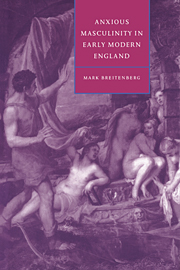Book contents
- Frontmatter
- Contents
- Acknowledgments
- Introduction
- 1 Fearful fluidity: Burton's Anatomy of Melancholy
- 2 Purity and the dissemination of knowledge in Bacon's new science
- 3 Publishing chastity: Shakespeare's “The Rape of Lucrece”
- 4 The anatomy of masculine desire in Love's Labor's Lost
- 5 Inscriptions of difference: cross-dressing, androgyny and the anatomical imperative
- 6 Ocular proof: sexual jealousy and the anxiety of interpretation
- Notes
- Index
- Frontmatter
- Contents
- Acknowledgments
- Introduction
- 1 Fearful fluidity: Burton's Anatomy of Melancholy
- 2 Purity and the dissemination of knowledge in Bacon's new science
- 3 Publishing chastity: Shakespeare's “The Rape of Lucrece”
- 4 The anatomy of masculine desire in Love's Labor's Lost
- 5 Inscriptions of difference: cross-dressing, androgyny and the anatomical imperative
- 6 Ocular proof: sexual jealousy and the anxiety of interpretation
- Notes
- Index
Summary
The central proposition of this book is that the phrase “anxious masculinity” is redundant. Masculine subjectivity constructed and sustained by a patriarchal culture – infused with patriarchal assumptions about power, privilege, sexual desire, the body – inevitably engenders varying degrees of anxiety in its male members. In early modern England, despite a broad and powerful discourse that assumed a natural, divinely ordained basis for authority based on gender and status, signs of anxiety among those whose privilege might have seemed inviolable are widespread; once identified and brought to the surface, masculine anxiety appears as ubiquitous as E. M. W. Tillyard's discoveries of “order” in every facet of Elizabethan life. If Tillyard and the tradition of scholarship he represents could see that earlier historical moment as a static and orderly “picture,” my own portrait would be better drawn by the witches in Macbeth: a cauldron of bubbling anxieties, a language of unresolvable contradictions and paradoxes, a world gray and ambivalent rather than clear and categorizable. To the extent that we may say “order” prevailed, it did so not because “God hath created everything in its proper place,” as Elizabeth's “Homily on Obedience” asserts, but because anxiety, paradox and contradiction could be assimilated, assuaged, contained, or put to some productive use. The same homily also offers a dire vision of its own underside – a kind of cultural unconscious that lurks beneath the theoretically placid surface: “For where there is no ryght ordre, there reigneth all abuse, carnal libertie, enormitie, synne, and Babilonical confusyon.”
- Type
- Chapter
- Information
- Anxious Masculinity in Early Modern England , pp. 1 - 34Publisher: Cambridge University PressPrint publication year: 1996



